A masters in secondary education can help you begin or advance your career in middle school or high school education.

Those who are compassionate and enjoy making meaningful connections with others often find a teaching career to be rewarding. Some individuals who graduate with their degree in secondary education go on to become advocates for inclusive school environments, driving positive change in their communities.
Editorial Listing ShortCode:
If you are eager to make a lasting impact on the lives of middle or high school students, you can start by earning your masters degree in secondary education.
Masters in Secondary Education Online Programs

A masters degree in secondary education is typically designed for working professionals with an interest in teaching at the middle or high school level.
In a secondary education program, you’ll study pedagogical theory and educational equity. You can also learn how to develop and deliver academic curricula, implement comprehensive classroom management strategies, and collaborate with diverse teaching teams.
Current teachers may also pursue their masters in secondary education online as a way to advance their qualifications and broaden their knowledge of educational theories and practices. Other professionals from a diverse range of fields may also decide to earn a masters in secondary education in order to gain teaching experience and earn their teaching certificate.
In a typical master degree in secondary education program, course topics may include:
- Classroom ecology
- Teaching writing
- Teaching mathematics in secondary schools
- Adolescent development
- Foundations in instructing English language learners
- Evaluation of instruction
- Science teaching methods
- Inclusive classrooms
Most programs also include a practicum or field study requirement. This gives students an opportunity to develop their teaching skills and receive feedback from an experienced mentor.
Editorial Listing ShortCode:
Some secondary education master’s programs also provide an option to select a concentration. This is especially helpful if you have an interest in teaching a specific grade level or content area, such as middle school math or high school biology. Sample concentrations include:
- Science
- English
- Math
- Social studies
- Spanish
If you are not sure which subject area you would like to focus on, many programs also offer an option for a more general approach.
Many graduates with a master’s degree in secondary education pursue teaching jobs at the middle or high school level. Some use their degree to advance their education career, moving into positions in administration or leadership. Common secondary education roles include:
- High school teacher
- Middle school teacher
- Instructional coordinator
- Principal
- School superintendent
The subject area you choose to focus on in your graduate studies program can also impact the specific professional roles you will be qualified to perform. If you’re interested in a teaching role, it’s helpful to verify that your chosen masters program leads to teaching licensure.
Common Online Masters in Secondary Education Concentrations

Selecting a concentration can help you align your studies with your career goals. The concentrations available to choose from differ between secondary education degree programs.
Some common concentrations include:
- History and Social Studies. This concentration helps prepare you to become a history teacher, and it offers courses in social studies content as well as pedagogical theory.
- Mathematics. In this concentration, you can learn the necessary skills to teach math at a secondary level while covering core subjects like calculus and geometry.
- English Language Arts. This concentration is centered around equipping you to teach reading and writing at the middle or high school level. It also explores areas like curriculum development and assessment.
- Staff Development. This concentration explores different ways in which leaders can strengthen their staff and build confidence and skills, in turn improving curriculum and instruction.
- STEM. In this concentration, you’ll study a variety of instructional approaches to teaching science, technology, engineering, and mathematics. After earning a masters, some students continue on to earn an on-campus or online STEM PhD.
The right concentration for you will depend on your personal interests, academic strengths, and career aspirations.
Secondary Education Careers and Salaries
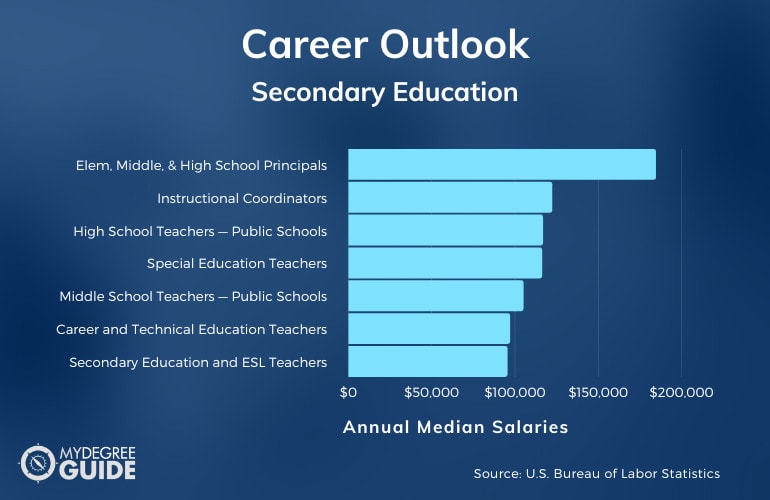
Most graduates who earn a master’s degree in secondary education go on to teach in high school or middle school. In some cases, practicing teachers choose to earn a graduate degree to increase their knowledge in a specific subject area or prepare for leadership roles within their school communities.
According to the Bureau of Labor Statistics, here are some common career options associated with the field of secondary education.
| Careers | Annual Median Salaries |
| Elementary, Middle, and High School Principals | $98,420 |
| Instructional Coordinators | $63,740 |
| High School Teachers — Public Schools | $62,420 |
| Special Education Teachers | $61,820 |
| Middle School Teachers — Public Schools | $61,680 |
| Career and Technical Education Teachers | $61,160 |
| Adult Basic and Secondary Education and ESL Teachers | $59,720 |
| High School Teachers — Private Schools | $56,510 |
| Middle School Teachers — Private Schools | $48,080 |
| Tutors | $36,470 |
A masters degree in secondary education is typically used to strengthen and build knowledge and skills in middle or high school teaching. If you want to be a teacher and do not have a teaching license, it’s strategic to enroll in a program with a licensure track.
Editorial Listing ShortCode:
Earning a graduate degree can also help you improve your chances of qualifying for leadership positions. An advanced degree does not guarantee a specific salary or title, though. Factors such as professional experience and geographic location can impact the types of jobs available to you.
Master of Secondary Education Curriculum & Courses

The specific curriculum for your master’s program in secondary education will vary depending on the school and concentration you choose.
A typical program may include some of the following courses:
- Teaching Writing: In this course, you’ll learn how to effectively teach writing strategies to middle and high school students.
- Teaching Mathematics in Secondary Schools: This course will help you develop teaching practices in math that promote inquiry and investigation at the secondary level.
- Adolescent Development: This course is an introduction to the different stages of adolescent development, and it covers topics like puberty, discrimination, and mental health disorders.
- Foundations in Instructing English Language Learners: Designed to equip you with the necessary skill to teach English language learners (ELLs), this course focuses on topics such as ELL policies, assessment, and oral language.
- Evaluation of Instruction: This course covers subjects like learning outcomes, rubrics, and assessment in order to prepare you to evaluate the success of your teaching.
- Science Teaching Methods: In this course, you’ll explore current theories and methods of teaching science to middle and high school students.
- Inclusive Classrooms: This course provides a foundation in building inclusive classrooms that support the academic, behavioral, social, and emotional needs of all students.
- Educational Psychology: This course examines educational theory and practice through a psychology lens, covering topics like motivation and creativity.
- Interdisciplinary Instruction: You’ll learn how to teach concepts from multiple disciplines to create a comprehensive learning experience for students.
- Technology in Content Area Teaching: In this course, you’ll learn how best to incorporate different types of technology into instruction.
Most programs also focus on teaching you the necessary skills to help students navigate some of the tough transitions that they face in middle and high school. This could include challenges like the college application process or switching schools.
How to Choose a Masters in Secondary Education Online Program

The process of selecting a master’s degree program in secondary education begins with developing an understanding of your academic and professional goals.
Here are some factors to consider as you make your choice:
- Cost. What can you afford to spend on your college experience? Are you willing to take out loans or apply for financial aid? Answering these questions can help you narrow down your list of potential schools.
- Availability. What is your preferred timeline? When are you available to attend classes? You can try to find schools that offer program schedules that align with your needs.
- Concentrations. What concentrations does a school offer? Knowing what subject area you would like to focus on can help you only apply to colleges that offer a concentration in that area.
- Program format. How do you learn best? Many online education degree programs offer classes in a variety of formats, including synchronous and asynchronous. Selecting a program that offers courses in your preferred learning format can help you get the most out of your educational experience.
In addition to these items, you might consider whether a specific program offers the option to become a licensed teacher. While some secondary education programs offer a licensure option, others do not.
Admissions Requirements

The admissions process is an opportunity for colleges to learn more about you as an applicant. In order to do this, admissions teams take into consideration several academic and personal items, including:
- GRE or GMAT scores (only some schools require them)
- Official transcripts
- Letters of recommendation
- Resume or CV
- Personal statement
While every school has unique application requirements, many do ask that you submit similar items. In addition to these materials, you may be asked to submit a small application fee, meet a minimum GPA requirement, and hold a bachelor’s degree from an accredited college or university.
Masters in Secondary Education Programs Accreditation

Regional accreditation is a status that’s awarded to a college or university that has met certain standards for quality. It is beneficial to attend a regionally accredited institution for several reasons, such as:
- Job opportunities. Many companies hire graduates from accredited institutions because they can trust that they’ve received reputable training.
- Quality of education. The professors, curricula, and facilities at an accredited school have all been evaluated and found to be up to standard.
- Financial aid. To qualify for federal financial aid, it’s necessary to attend an accredited school.
You can check if a school is accredited by visiting the US Department of Education online.
Secondary Education Licensure & Certifications
The specific licensure and certification requirements for secondary educators vary between states. Typically, teachers working in secondary education need a state-issued teaching certificate. In addition to a teaching certificate, many educators decide to pursue other certifications to demonstrate an ongoing commitment to professional development.
Editorial Listing ShortCode:
Some common certifications include national board certification and the International Society for Technology in Education certification. Both of these certifications require you to complete professional training and create a portfolio of work.
Financial Aid and Scholarships
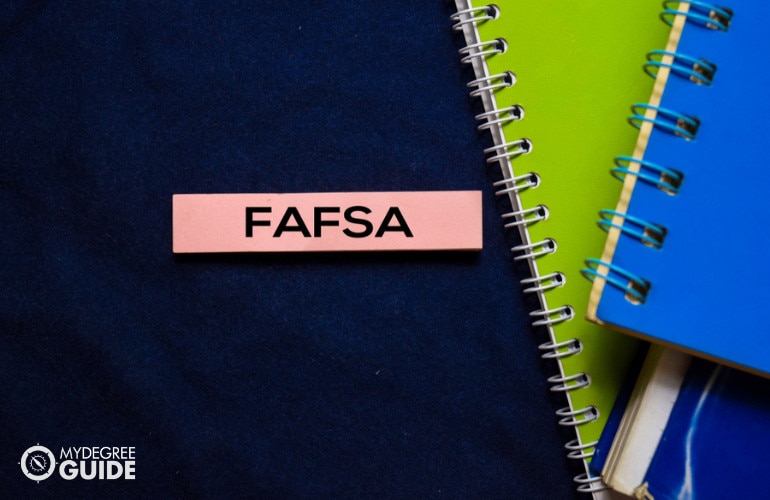
The costs of attending college can add up quickly, so many individuals and families rely on financial aid programs to help alleviate some of their financial obligations.
Types of financial aid include:
- Federal aid. You can see how much federal financial aid you can receive by filling out the Free Application for Federal Student Aid (FAFSA).
- State aid. State aid programs vary by location.
- Scholarships. Most schools offer scholarship opportunities for enrolled students who qualify.
- Employer programs. Some companies offer tuition reimbursement as part of their benefits package.
Taking advantage of financial aid programs may help you along your educational journey.
Secondary Education Professional Organizations
Joining a professional organization is a strategic way to network with individuals in your field. Here are some common organizations for secondary education professionals:
- Association for Supervision and Curriculum Development (ASCD): This organization provides resources for educators to help them improve their leadership skills to better support all students.
- Association of American Educators (AAE): A non-partisan organization, the AAE supports educators in rising to a standard of professionalism.
- Association of Middle Level Education (AMLE): Created for middle school educators, the AMLE helps teachers reach every student, grow their careers, and foster inclusive learning environments.
Professional organizations can also help you learn new skills and keep up with current developments in teaching.
What Is a Secondary Education Masters Degree?

A secondary education masters degree is designed for individuals with an interest in middle or high school education.
Many secondary education degree programs focus on strengthening and building classroom skills as well as studying adolescent development. Some individuals take this opportunity to select a specialization, such as science or math, on which to focus their studies.
Earning a graduate degree can often help educators qualify for promotions, increase their earning potential, and become stronger advocates and leaders.
What Can You Do with a Masters in Secondary Education Online Degree?
A graduate degree in secondary education often leads to a career in high school or middle school education. Many graduates work as middle school teachers or high school teachers in specific subject areas. Others choose to pursue leadership roles, becoming principals or school administrators. Educators may also choose to focus on curriculum design and assessment as instructional coordinators.
The type of role you qualify for may depend in part on your previous experience as well as your degree specialization. For instance, some graduates go on to work as special education teachers, career and technical education teachers, and adult secondary education instructors.
How Long Does It Take to Get a Secondary Education Masters Online?

Program lengths vary between schools, though most masters programs can be completed in 1 to 2 years. A typical program consisting of 36 credit hours with no thesis requirement may be completed in 1 year with full-time enrollment, including during the summer.
Editorial Listing ShortCode:
A thesis requirement will likely add additional time to completion, as will only attending school part-time. In general, an online program allows for more flexibility in schedule than a brick-and-mortar option, making it a strategic choice for students with personal or professional commitments.
What’s the Difference Between a Primary vs. Secondary Education Master Program?
The main difference between a primary and secondary education master’s program is the age group that each one focuses on.
| Primary Education | Secondary Education |
|
|
If you prefer working with elementary school students, a primary education master’s degree may be a more fitting choice. If you prefer working with middle or high school students, you might consider a secondary education degree program.
What’s the Difference Between Higher Education vs. Secondary Education Masters Programs?
Secondary education masters programs focus on the education of middle and high school students, while higher education masters programs focus on the education of college students.
| Higher Education | Secondary Education |
|
|
The age group you want to work with will help determine which program fits your needs.
What’s the Difference Between a Master of Arts vs. Master of Education in Secondary Education?
Here are some of the key differences between a Master of Arts (MA) in Secondary Education and a Master of Education (MEd) in Secondary Education.
- MA in Secondary Education: In an MA program, you’ll focus on subject-specific knowledge and information. You can also learn practical skills that you can use in the classroom.
- MEd in Secondary Education: In an MEd program, the focus is on researching and evaluating educational practices. While you can still learn hands-on, practical information, it will not make up the majority of your studies.
If you are hoping to become a teacher or advance your current teaching career, you might consider the benefits of an MA in Secondary Education.
Is a Master in Secondary Education Worth It?

Yes, a master in secondary education is worth it for many professionals. Many teachers form trusting relationships with their students, making a positive impact on their academic and personal development.
In addition to career satisfaction, the Bureau of Labor Statistics projects 8% job growth for high school teachers over the next ten years. Teachers with a masters often have increased earning potential. A graduate degree in education can also help prepare you for leadership roles in the field.
Editorial Listing ShortCode:
In addition to teaching roles, secondary education positions can include principals, administrators, and instructional coordinators.
Universities Offering Online Masters in Secondary Education Degree Program
Methodology: The following school list is in alphabetical order. To be included, a college or university must be regionally accredited and offer degree programs online or in a hybrid format.

The Master of Arts in Secondary Teaching program at the American College of Education can typically be completed in 21 to 22 months. This flexible online program is designed for students who intend to transition into teaching after earning bachelor’s degrees in other fields. Students are required to participate in field experiences and student teaching throughout the program.
The American College of Education is accredited by the Higher Learning Commission of the North Central Association.

Arizona State University’s online Master of Education in Secondary Education program consists of 13 courses that are each 7.5 weeks long. Courses include Instructional Design, Planning, and Assessment, Research and Evaluation in Education, Literacy Across the Disciplines, General Methods and Assessment, and more.
ASU is accredited by the Higher Learning Commission.
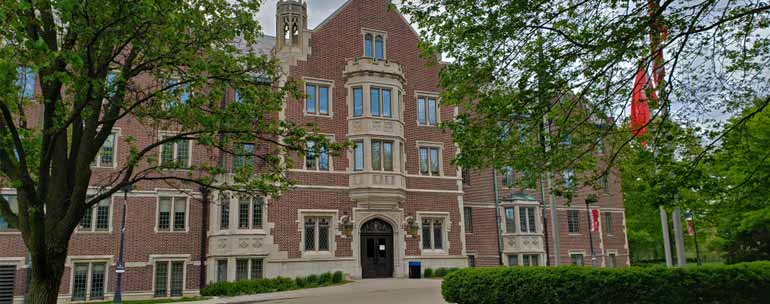
Ball State University offers a fully online program for a Master of Arts in Secondary Education. The degree requires 30 credits of coursework and can typically be completed in 4 to 5 semesters. A Secondary Teaching License concentration is available for students who are not already licensed as teachers.
Ball State is accredited by the Higher Learning Commission.

Clemson University’s MAT in Secondary Education program is designed to help students transition into a teaching career after earning a bachelor’s degree in a non-education field. The curriculum is designed to prepare students for initial certification to teach high school in the state of South Carolina. Courses include deadlines but are otherwise asynchronous.
Clemson University is accredited by the Southern Association of Colleges and Schools Commission on Colleges.
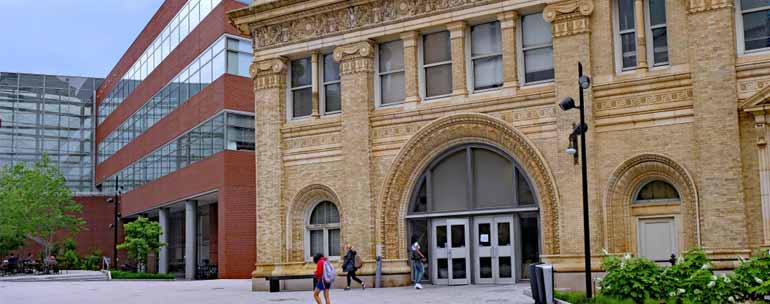
The coursework for Drexel University’s MS in Secondary Education program can be completed entirely online. The program’s required student teaching component can be completed at a convenient school district. Graduates may become certified teachers in almost any state. Certification areas include English, Mathematics, Biology, Chemistry, Physics, Earth and Space Science, General Science, and Social Studies.
Drexel University is accredited by the Middle States Commission on Higher Education.

Georgia College & State University offers an MAT in Secondary Teacher Education. The program is designed to help those that are not already certified teachers gain certification to teach various subjects in grades 6-12. Online and evening classes are available to accommodate working professionals, and students can usually finish the program in 1 to 2 years.
Georgia College & State University is accredited by the Southern Association of Colleges and Schools Commission on Colleges.

Georgia Southern University offers a fully online program for an MEd in Secondary Education that is intended for those who are already certified teachers in Georgia.
Available concentrations include Geography, Economics, Broad Field Science, Chemistry, English, History, Mathematics, Physics, Biology, and Political Science. The program requires the completion of 36 credit hours of coursework and includes multiple field experiences.
Georgia Southern University is accredited by the Commission on Colleges of the Southern Association of Colleges.

Grand Canyon University offers an online program for an MEd in Secondary Education—STEM. The program is designed to lead to initial teacher licensure. It consists of 41 credits taken in the form of 6 week classes. Coursework includes Adolescent Literacy, Survey of Special Education: Mild to Moderate Disabilities, Integrating STEM Methods for Middle and High School Instruction, and more.
Grand Canyon University is accredited by the Higher Learning Commission.

Mercy College offers a Master of Science in Adolescence Education, Grades 7-12. The program requires 36 credits of coursework and has concentrations available in English, Math, Biology, Chemistry, Physics, and Social Studies. Students may also get a dual certification in one of these subjects and Teaching Students with Disabilities.
Mercy College is accredited by the Middle States Commission on Higher Education.

New York University’s MAT in Secondary Education program uses a 1 year cohort model. Students are required to participate in immersive field experiences and live online classes that meet twice a week in the evenings. The program prepares students to teach English, math, science, or social studies to grades 7-12. NYU’s curriculum emphasizes social justice and cultural responsiveness.
New York University is accredited by the Middle States Commission on Higher Education.
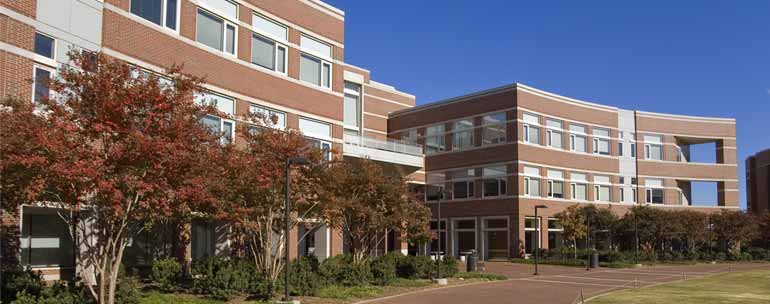
At North Carolina State University, students can earn an MAT at the secondary level in one of four areas: Mathematics, Science, Social Studies, or English. Students can typically earn their initial teaching license in just a year and a half. All programs are delivered in a hybrid format and require GRE scores to apply.
North Carolina State University is accredited by the Southern Association of Colleges and Schools Commission on Colleges.

Northwestern State University of Louisiana offers an online program for an MAT in Secondary Education. The program is designed to lead to Louisiana certification to teach grades 6-12.
Students may focus on Biology, Chemistry, English, Mathematics, Physics, Social Studies, Business, Family and Consumer Sciences, or Speech. The program requires the completion of 33 credit hours of coursework and can be started in the fall, spring, or summer.
The Northwestern State University of Louisiana is accredited by the Southern Association of Colleges and Schools Commission on Colleges.

Pennsylvania Western University offers a 100% online program for an MEd in Education Leadership: Advanced Studies in Secondary Education and Teacher Leadership. It is designed for professional teachers who work full-time. Classes are asynchronous to provide maximum flexibility, but students are still provided with opportunities to communicate with the classmates in their cohort.
Pennsylvania Western University is accredited by the Middle States Commission on Higher Education.
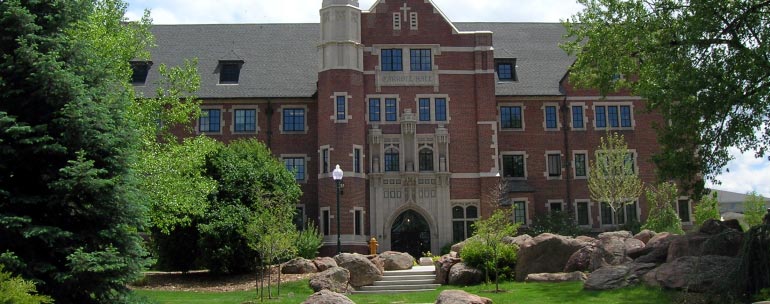
Regis University offers an MEd in Secondary Education program that is designed to lead to initial licensure to teach grades 7-12. Courses are online, and each one is 8 weeks long. Students usually finish the program in 2 to 3 years. Content areas include English, social studies, math, science, business, and world languages.
Regis University is accredited by the Higher Learning Commission.

Saint Joseph’s University offers an MS in Secondary Education. The program requires the completion of 30 credits of coursework. It features concentrations in English, Mathematics, Biology, Chemistry, Physics, General Science, Social Studies, Computer Science, and Citizenship Education. Coursework is 100% online, but students are required to participate in student teaching and field experiences.
Saint Joseph’s University is accredited by the Middle States Commission on Higher Education.
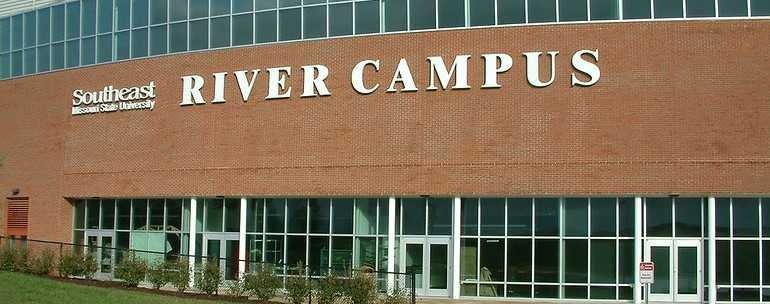
Southeast Missouri State University offers an online program for an MA in Secondary Education. Specialty areas include English, Science, Art, Autism, and Educational Technology. The program requires 30 credit hours. It consists of courses such as Methods of Research, Multimedia in Education, Teaching in a Multicultural Society, Improvement of Instruction and Assessment, and more.
SEMO is accredited by the Higher Learning Commission’s Commission on Institutions of Higher Education.
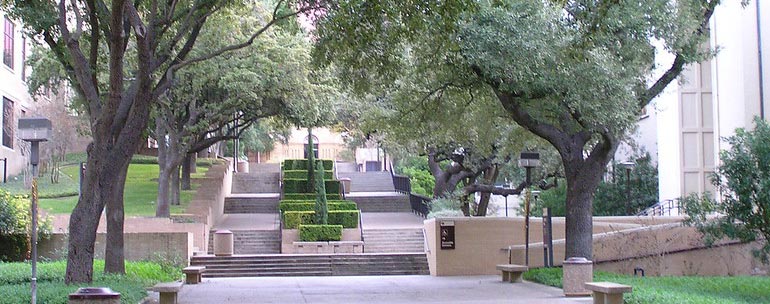
Texas State University offers both an MA and an MEd in Secondary Education. The main difference between the two is that the MA requires a thesis and is primarily recommended for those planning to pursue doctoral studies. The MED has an option for those seeking initial teacher certification. Texas State offers courses both online and face-to-face.
Texas State University is accredited by the Southern Association of Colleges and Schools Commission on Colleges.
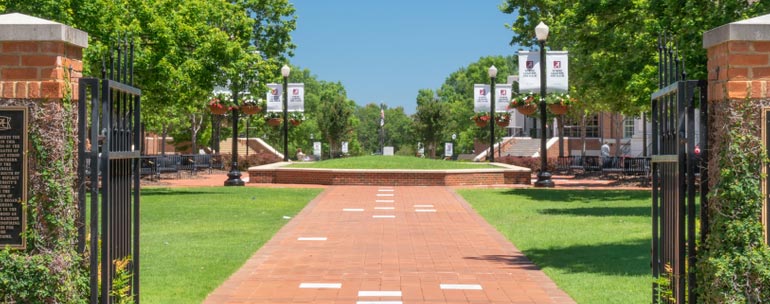
The University of Alabama offers an online program for a Master of Arts in Secondary Education (English Language Arts). To graduate, students must complete 30 credit hours. The program consists of courses such as Introduction to Educational Research, Computer-Based Instruction, Modern Secondary School Programs, and more. It is intended for those who are already certified to teach language arts at the secondary level.
The University of Alabama is accredited by the Southern Association of Colleges and Schools Commission on Colleges.

The Master of Arts in Teaching program from the University of Central Missouri is designed to help students earn their initial teaching certification in as little as 2 years. The program is available online and on campus in Warrensburg. Coursework includes Advanced Educational Psychology, Introduction to Research, and Classroom Discipline and Motivation, and more.
The University of Central Missouri is accredited by the Higher Learning Commission.
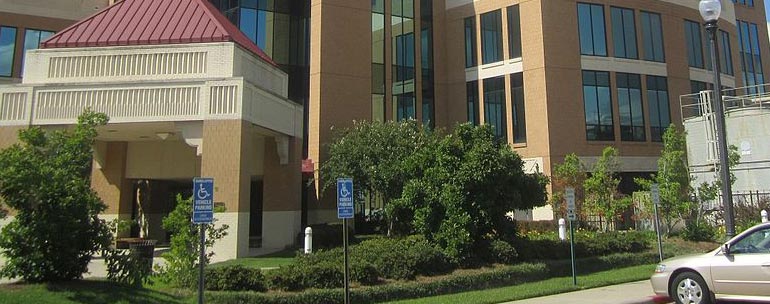
The University of Louisiana—Monroe offers a Master of Arts in Teaching Secondary Education. The program is intended for those who wish to pursue Louisiana Teacher Certification and already hold a bachelor’s degree in a field outside of education. The program requires the completion of 36 credit hours of coursework and is available online.
The University of Louisiana Monroe is accredited by the Southern Association of Colleges and Schools Commission on Colleges.
Getting Your Master’s Degree in Secondary Education Online

Earning a masters degree in secondary education online can enable you to build skills and knowledge in the realm of middle and high school education.
Not only can you select a specialization that aligns with your personal interests and academic strengths, but you can also gain valuable leadership and communication tools. Plus, earning a masters degree can help you stand out from others in your field. Graduate-level training may help you qualify for career advancement and higher earnings.
If you’re ready to take this next step in your educational and professional journey, you can start exploring online secondary education graduate programs from accredited schools today.

